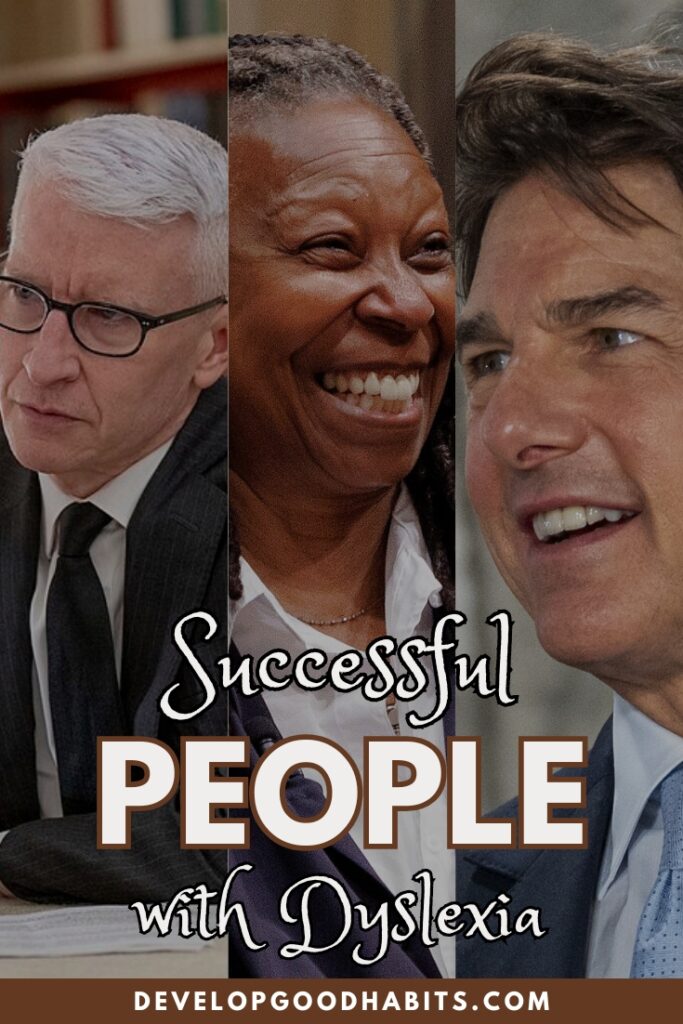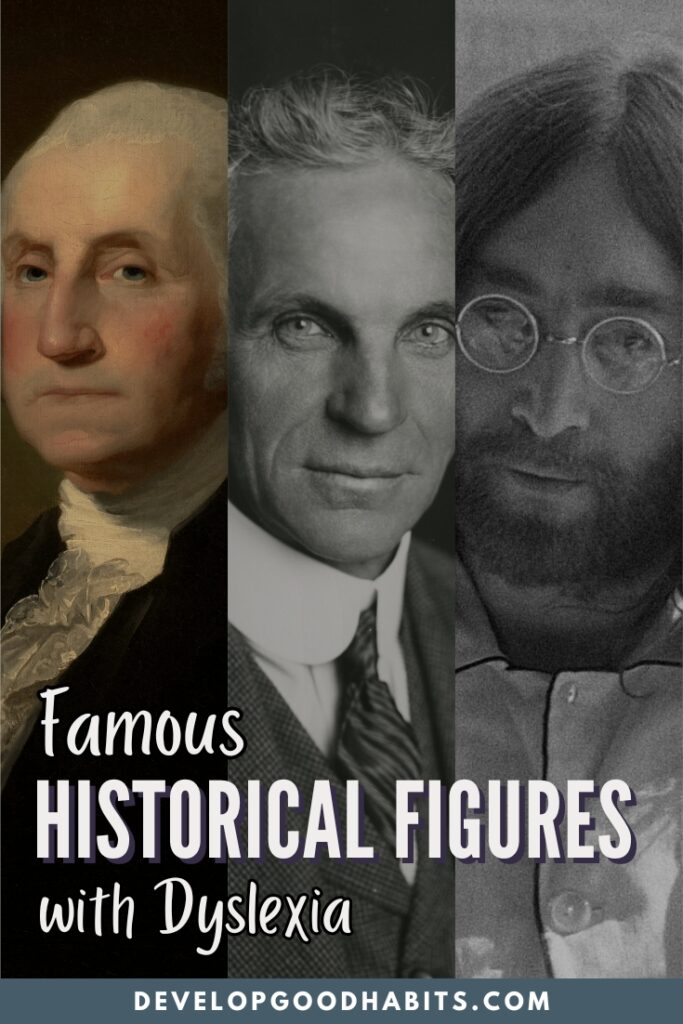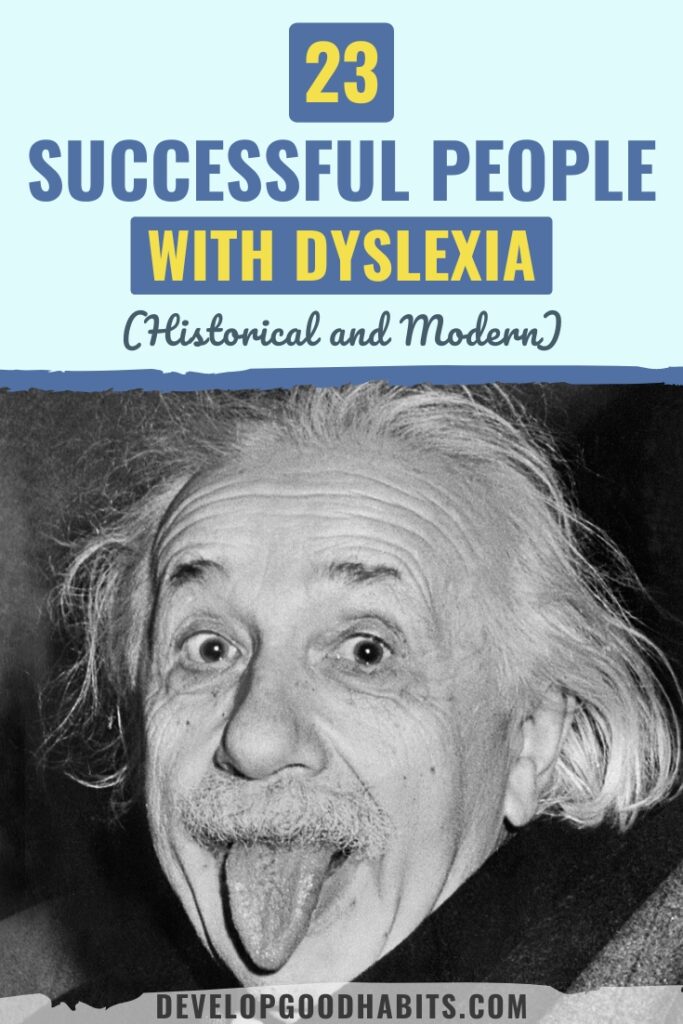When most people think of dyslexia, they picture reversed letters or jumbled words—but that’s just one small part of the story.
Dyslexia is a lifelong difference in how the brain processes written language, affecting up to 10% of the population. While it can make reading and writing challenging, it also often comes with unique strengths—like creativity, big-picture thinking, and problem-solving skills.
In this post, we’re celebrating famous people and historical figures who turned their struggles with dyslexia into superpowers, proving that success isn’t about how you read—it’s about how you think.
What Is Dyslexia?
Dyslexia is a general term for a learning disorder that impacts one’s ability to read or interpret words, letters, and symbols but does not affect general intelligence. Following are answers to some frequently asked questions about dyslexia.
What are the signs and symptoms of dyslexia?
Dyslexia looks different for everyone—some people just need extra time to read or spell, while others face bigger challenges without proper support.
Common signs include trouble recognizing letters, rhyming, or sounding out words, and later on, difficulty reading smoothly or organizing thoughts in writing.
It’s not about intelligence—people with dyslexia usually think just as quickly as others; their brains simply process language in a different way. Because symptoms can vary so widely, many people go undiagnosed for years.
Some other possible symptoms of dyslexia are:
What causes dyslexia?
Dyslexia can be either acquired or developmental. Acquired dyslexia can surface after suffering from a traumatic brain injury, stroke, or ear infections that occur in early childhood.
Research shows dyslexia often runs in families and is linked to genetic differences that affect the way the brain connects sounds to written letters and words. These differences appear in areas of the brain responsible for reading and language processing, making it harder to decode words quickly and accurately.
Environmental factors, like early language exposure and quality of reading instruction, can also influence how strongly dyslexia shows up, but the core cause is neurological, not educational.
Successful People with Dyslexia
In recent times, success stories of entertainers, innovators, and leaders with dyslexia have become powerful reminders of what’s possible.
Psychologists now recognize that dyslexia doesn’t define limits—it reveals different strengths in how people think and create. The following people are a testament to how unique minds can turn challenges into triumphs, proving that success defies convention.
1. Tom Cruise
Tom Cruise, one of the world’s highest-paid actors, is open with the public about his battle with dyslexia. Diagnosed at the age of 7, Cruise tried to hide his inability to read and write fluidly from his friends.
Cruise claims that upon graduating from high school, he was functionally illiterate and even struggled to read movie scripts when starting his career.
While he was embarrassed by his dyslexia as a child, he has since learned to accept it as an adult and overcome this adversity he faces thanks to hard work and coping strategies
2. Jamie Oliver
Jamie Oliver turned his dyslexia from a classroom challenge into a recipe for success. Struggling in school and placed in special education classes, he didn’t realize dyslexia was behind his difficulties—but once he found his passion for cooking, nothing could hold him back.
Today, the world-famous chef proves that talent and determination can outshine any obstacle.
3. Anderson Cooper
As a child, Anderson Cooper certainly didn’t expect to be the face of news worldwide, winning six Emmy Awards as a journalist. Anderson struggled with reading growing up and sometimes even pretended to make sense of what he was reading to keep up with his peers.
Luckily for Cooper, his teachers were keen on his intelligence, aside from his challenges with reading, and set up proper supports within the school to give him extra help with a reading specialist. With helpful resources in place, Cooper started to make great strides with his literacy and ended up being accepted to Yale University to study journalism.
Cooper reports that, as a successful adult, he is grateful for the teachers at his school who saw his potential and were proactive about his reading struggles.
4. Whoopi Goldberg
When looking back on her childhood, Goldberg notes, “The thing that crushed me more than anything was: I didn’t understand how they didn’t see I was smart, I just couldn’t figure things out the way they were doing it.”
Bullied in school and called “dumb” before she knew she had dyslexia, Whoopi Goldberg found strength in her mother’s belief that she could be anything she wanted. That confidence carried her to become one of the few people ever to earn an EGOT—an Emmy, Grammy, Oscar, and Tony. Goldberg credits her dyslexia for helping her think differently, saying her brain “sees and puts information… more interestingly” than most.
6. Steven Spielberg
ET, Indiana Jones, Goonies and Jaws are just a few of the legendary films that Steven Spielberg has directed. So how did a child so far behind in school win Multiple Academy Awards, Emmy’s and Golden Globes?
He was in his 60s when he was diagnosed with dyslexia. As a child, teachers thought he was lazy, his classmates bullied him, and he was made to feel like an outsider. But these adverse experiences helped him succeed when writing about characters who are outsiders,
In an interview with Spielberg, he discussed his success despite his dyslexia diagnosis: “It’s of critical importance to me that I read books and scripts…It takes me about two hours and 45 minutes to read what most people can read in about an hour and 10 minutes. I just know that I’m still slow at reading, but I’ve learned to adjust.”
7. Richard Branson
Richard Branson turned his childhood struggle with dyslexia into one of his greatest business superpowers.
The Virgin Group entrepreneur says thinking differently helped him spot creative solutions others missed—and build a global empire of 400+ companies. Now, he’s on a mission to end the stigma around dyslexia and show that it’s not a setback, but a secret advantage.
8. Steve Jobs
Steve Jobs was never officially diagnosed with dyslexia, but many experts and biographers believe he may have had it based on his learning style and struggles in school. As a child, Jobs found traditional education frustrating—he often clashed with teachers, had difficulty focusing on reading-heavy tasks, and preferred hands-on, creative projects. These traits, combined with his extraordinary ability to visualize ideas and think conceptually, align with many characteristics commonly seen in people with dyslexia.
Whether or not he had a formal diagnosis, Jobs often credited his unconventional thinking for Apple’s success. His ability to see connections others missed, simplify complex technology, and communicate ideas visually helped revolutionize entire industries. Many believe that what might have been a challenge in the classroom became his greatest strength in the boardroom—proof that thinking differently can change the world.
9. Muhammad Ali
Muhammad Ali, one of the greatest boxers of all time, faced significant challenges with reading and academics due to dyslexia. In school, he often struggled to keep up and was unfairly labeled as slow, but his confidence and determination never wavered.
Ali’s dyslexia didn’t stop him from mastering strategy, quick thinking, and mental toughness in the ring—skills that made him a legend. Later in life, he used his platform to inspire others, proving that intelligence and greatness aren’t defined by how well you read, but by how hard you fight for your dreams.
10. Cher
The iconic actress, singer-songwriter, and music industry legend has long been open about her struggles with dyslexia, sharing her story in her autobiography.
Growing up, reading and homework were tough, but Cher’s creativity and determination helped her shine in ways that books never could. Her story shows that you don’t have to fit the mold to break records—you just have to believe in your own rhythm.
11. Henry Winkler
Best known as “The Fonz” from Happy Days, a super cool persona from the TV show, Winkler spent years thinking he wasn’t smart because of undiagnosed dyslexia.
Once he learned the truth, everything changed. He’s since become a passionate advocate for kids with learning differences and even co-authored a bestselling children’s book series inspired by his own experiences—proving that even the coolest guy on TV can turn his biggest challenge into his greatest gift.
12. Tom Holland
Before swinging onto screens as Spider-Man, Tom Holland faced his own challenges with dyslexia. Diagnosed at a young age, he worked hard to keep up in school while pursuing acting.
Holland credits his family’s support and perseverance for helping him thrive, showing fans everywhere that heroes come in all forms—and sometimes, their superpower is thinking differently.
13. Jennifer Aniston
Jennifer Aniston mentioned in a Hollywood Reporter interview that she didn’t discover she had dyslexia until she was in her 20s. What once made her doubt her intelligence suddenly made sense—and it became a turning point.
Aniston has since spoken openly about how understanding her dyslexia helped her gain confidence and embrace her strengths, proving that self-discovery can be just as powerful as any Hollywood role.
Famous Historical Figures with Dyslexia
mention that this can sometimes be controversial, since diagnosis for Dyslexia wasn’t as common in the past, and we have to often rely on historians review of existing letters and writings. Visionaries, thinkers, success stories, own problems, struggles of dyslexia
14. George Washington
The first President of the United States is believed to have had dyslexia, which made reading and writing a lifelong challenge. Yet, his leadership, determination, and strategic mind helped shape a nation. Washington proved that true intelligence isn’t measured by how you read—but by how you lead.
15. Pablo Picasso
Pablo Picasso, once labeled “reading blind” as a child, turned his struggle with letters and numbers into artistic genius.
His tendency to flip shapes and rearrange forms in his work is now seen as a reflection of how dyslexia shaped his vision—transforming his challenges into some of the most iconic art the world has ever seen.
16. Albert Einstein
Albert Einstein, one of the most influential physicists of the 20th century, loved math and science but struggled with grammar and spelling. His headmaster once labeled him “borderline intellectually impaired” and suggested trade school—a claim that couldn’t have been further from the truth. Many experts now believe Einstein had dyslexia, given his delayed speech, difficulty writing, and challenges reading aloud.
Einstein himself explained that he rarely thought in words, but instead in vivid images and concepts—a hallmark of dyslexic thinking. That unique way of processing information helped him see connections others missed, leading to groundbreaking discoveries in physics and proving that thinking differently can change the world.
17. Leonardo da Vinci – inventor, painter, mona lisa, scientist
The legendary inventor, scientist and painter of the Mona Lisa showed signs of dyslexia through his mirrored handwriting and unconventional spelling. But those same traits fueled his genius—allowing him to see the world from angles no one else could.
Da Vinci’s incredible mind turned what others saw as a flaw into pure innovation.
18. F. Scott Fitzgerald
F. Scott Fitzgerald, author of The Great Gatsby, is believed to have had dyslexia—a challenge that made school tough and spelling nearly impossible.
Kicked out of school at 12 for “refusing” to focus, he later turned his struggle with words into literary magic. Even with typo-filled drafts and “lamentable” spelling, Fitzgerald’s creativity and storytelling brilliance defined an era and proved that genius doesn’t need perfect grammar.
19. Agatha Christie
The queen of mystery and creator of Hercule Poirot and Miss Marple struggled with dyslexia her entire life, often finding writing and spelling difficult. But her imagination and storytelling brilliance made her the best-selling novelist of all time—proof that even if words don’t come easily, stories still can.
20. Henry Ford
The founder of the Ford Motor Company, Henry Ford, faced learning challenges believed to stem from dyslexia.
Reading may have been tough, but his mechanical genius and vision for innovation changed the world. Ford turned his struggles into fuel for creativity—driving the automotive revolution forward.
21. Thomas Edison
The inventor of the light bulb and countless other innovations, Thomas Edison struggled in school and was often mislabeled as slow. In reality, his dyslexia pushed him to think differently and experiment endlessly.
22. John Lennon
The legendary musician and lead singer of The Beatles reportedly had dyslexia, which made reading difficult but creativity effortless. His lyrical genius and visionary songwriting changed music forever—proving that brilliance doesn’t follow the rules, it rewrites them.
23. Walt Disney
Despite facing challenges with reading and writing, Walt Disney built an empire of imagination and fame. His dyslexia didn’t stop him from dreaming big—it helped him see magic where others saw limits.
Disney’s story shows that when you think differently, you can create worlds that inspire generations. Want some more inspiration from Disney? See some of the best Walk Disney Quotes.
Final Thoughts on Successful People with Dyslexia
Dyslexia hasn’t prevented these people from succeeding and living up to their potential in their chosen fields. These people are role models for those facing a life challenge that may make success seem a little bit more out of reach. Hopefully, you’ve found these stories inspiring.
If you or someone you love had this learning disability check out this site to find some dyslexia help.
For more inspiring stories about people who overcame challenges, check out these articles that recount famous people with autism spectrum disorder and successful people with obsessive-compulsive disorder.
See more stories of overcoming obstacles to achieve success:

Connie Mathers is a professional editor and freelance writer. She holds a Bachelor’s Degree in Marketing and a Master’s Degree in Social Work. When she is not writing, Connie is either spending time with her daughter and two dogs, running, or working at her full-time job as a social worker in Richmond, VA.
Trending Products

Chimes Set of 4 – Handmade Wind C...

BEST 100 Daily Meditation Cards | A...

Melous 4 in 1 Sandalwood Gua Sha Ma...

rylaxtones Carrying Case Travel Cas...

ProsourceFit Acupressure Mat and Pi...

Mindfulness Breathing Necklace Stre...

Woodstock Wind Chimes Zenergy Hand ...

ENFANTRY Breathing necklace Mindful...

TNZMART Hanging 9 Note Sound Healin...









